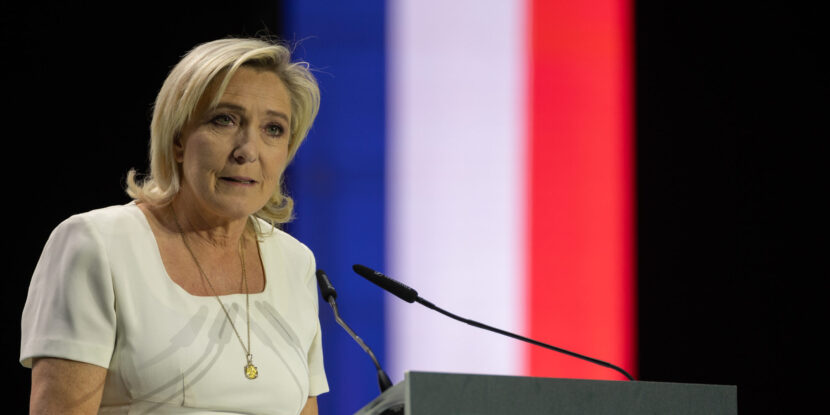
PULSE POINTS:
❓What Happened: Marine Le Pen, leader of France’s National Rally (RN) party, was found guilty of misusing European Union (EU) funds by a Paris court, sentenced to four years in prison (two suspended, two under house arrest), fined €100,000 (~$105,000), and barred from the 2027 presidential race. The populist political leader is now appealing the verdict.
👥 Who’s Involved: Marine Le Pen; French judiciary; Matthieu Almeras, Paris bar lawyer; Gabriel Attal, former French Prime Minister.
Your free, daily feed from The National Pulse.
📍 Where & When: Paris court ruling decision announced on a Monday; Paris Court of Appeal ruling expected by summer 2026.
💬 Key Quote: “This is a double-edged sword for Le Pen, who could receive a heavier or lighter sentence,” stated Matthieu Almera, a French legal commentator.
⚠️ Impact: Le Pen has filed an appeal delaying prison and financial penalties but maintaining ineligibility for office; questions are being raised about the speed of the appeal process.
IN FULL:
Marine Le Pen, the leader of France’s populist National Rally party and 2027 presidential election frontrunner, has declared her intention to challenge a recent Paris court verdict that found her guilty of embezzling European Union funds. Following the verdict, the court sentenced Le Pen to four years in prison, with two years suspended and two under house arrest, accompanied by a fine of €100,000. The court also ruled that Le Pen is prohibited from participating in any elections for the next five years, rendering her unable to compete in the 2027 presidential election.
While Le Pen’s appeal delays the imposition of a prison sentence and fine, her ineligibility to run for public office remains intact. The Paris Court of Appeal is now set to evaluate her case, with a decision anticipated by mid-2026. According to French legal commentator Matthieu Almeras, the appeal “is a double-edged sword for Le Pen, who could receive a heavier or lighter sentence.”
Should the initial judgment stand, Le Pen has further judicial avenues, including the Court of Cassation, which reviews procedural adherence rather than case facts, and potentially the European Court of Human Rights, although such cases would extend beyond the 2027 electoral timeline, given the exhaustive nature of the processes involved.
The relatively rapid processing of Le Pen’s appeal has also sparked debate within France’s legal circles. Political opponents of Le Pen and the National Rally contend the expedited legal proceedings raise questions of fairness and equality under the law. Former French Prime Minister Gabriel Attal, the leader of Emmanuel Macron‘s Renaissance party, criticized the fast pace of the appeal, telling reporters on Tuesday that he wouldn’t know what to say to those whose appeals might be delayed so that the court can take up Le Pen’s legal challenge. However, the obvious answer to this is that a slower appeal might leave her unable to run in 2027 even if she pleads her case successfully.
Many regard Le Pen’s conviction, which hinges on the fact she used assistants at the European Parliament, paid via EU funds, to perform domestic party work, as a farce. Even liberal journalists concede that “hundreds” of European Parliament members use their parliamentary assistants in this way without sanction.

PULSE POINTS:
❓What Happened: Special elections are being held in two Florida congressional districts that were previously considered safe for Republicans, with increased attention after President Donald J. Trump removed Rep. Elise Stefanik (R-NY) from consideration for U.N. ambassador over concerns the House Republican majority could be in jeopardy.
👥 Who’s Involved: Democratic candidate Josh Weil, Republican state Sen. Randy Fine, Republican Jimmy Patronis, Democrat Gay Valimont, former Rep. Mike Waltz (R-FL), former Rep. Matt Gaetz (R-FL), President Trump, and House Minority Leader Hakeem Jeffries.
Your free, daily feed from The National Pulse.
📍 Where & When: Special elections in Florida’s 6th and 1st Congressional Districts, with voting on Tuesday, April 1.
💬 Key Quote: President Trump stated, “We don’t want to take any chances… It’s basic politics.”
⚠️ Impact: These contests are drawing significant attention due to unexpected competitiveness and are seen as a litmus test for GOP strength, potentially affecting legislative support for Trump’s agenda.
IN FULL:
Two critical special elections in Florida are underway as voters head to the polls on Tuesday. The two high-profile races for the House of Representatives could significantly impact the Republican majority in Congress and whether the party continues to control the lower legislative chamber in the coming months.
Last week, President Donald J. Trump moved to withdraw Rep. Elise Stefanik’s (R-NY) nomination for U.N Ambassador as a Republican loss in either of the Florida races today could reduce the GOP majority to just a three-seat margin. Republicans currently hold a five-seat edge over the Democrats. However, there are four vacant House seats, with two of the vacancies being in deep blue Democrat districts.
The move to withdraw Stefanik’s appointment signals Trump’s intent to prevent further weakening of the House majority. Trump commented, “We don’t want to take any chances… It’s basic politics.”
In the 6th District, which spans Florida’s Eastern Coast, Democrat Josh Weil is facing off against Republican state Sen. Randy Fine. The district was previously held by Mike Waltz, who vacated his seat for a role as Trump’s national security advisor. Notably, Weil, a teacher, has gathered over $9 million in campaign funds by mid-March, significantly overshadowing Fine’s less than $1 million, as per Federal Election Commission data. Retaining this seat is considered absolutely crucial to the GOP majority’s continued control of the House.
Meanwhile, the 1st District in the Panhandle pits Republican Jimmy Patronis, Florida’s chief financial officer, against Democrat Gay Valimont, an ardent gun control advocate. This race replaces former Rep. Matt Gaetz (R-FL), who resigned following House Ethics Committee allegations hindering his nomination for attorney general. Valimont’s campaign raised nearly $6.5 million compared to Patronis’ $2.1 million by mid-March.
These elections, alongside a Wisconsin Supreme Court race, are the first since Trump resumed office, offering insights into the GOP’s standing. Additionally, Wisconsin Democrats hope that control of the state’s Supreme Court can clear the way for mid-decade redistricting, with Republicans likely to lose a Congressional seat in the state under a new district map.
Despite enthusiasm among Democratic Party activists, House Minority Leader Hakeem Jeffries (D-NY) has stopped short of guaranteeing any pickups for his party this evening. “What I can say, almost guarantee, is that the Democratic candidate in both of these Florida special elections will significantly over-perform, which will represent another sign that the Republicans are on the run and that Democrats are going to take back control of the House of Representatives next year,” Jeffries said on Tuesday.
show less

 2 months ago
8
2 months ago
8








 English (US) ·
English (US) ·